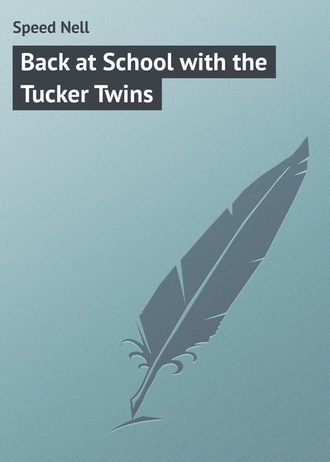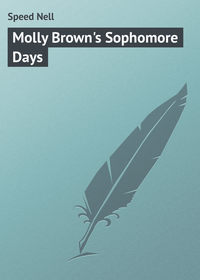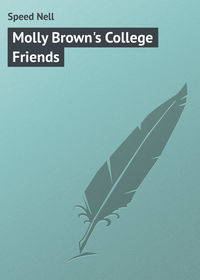 полная версия
полная версияBack at School with the Tucker Twins
Take two tender new pupils (Freshmen preferred, Juniors out of the question), stick them together in a corner, with a thin slice of reserve between them, season to taste with some spicy gossip and a little lollapalusser. After a year in a cool place they will be fit to eat.
* * * * *Brown Betty à la FacultyTake two crusty members of the faculty and let them grate against each other until both are reduced to crumbs. Place in baking dish a layer of crumbs and a layer of tart apples of discord well chopped. Sweeten well with high-toned politeness, veiled with sarcasm. Serve piping hot with the same kind of sauce you give to the gander.
* * * * *French Dressing as Served at GreshamLet the ingredients stay in bed until ten minutes before breakfast, then in a wild scramble cover with a thin layer of clothes without the formality of bathing or even taking off nightgown when breakfasting en famille. Do hair with a lick and a promise and beat all the other girls to the table.
* * * * *FASHION NOTESBy Virginia TuckerThe newest fad among the women who know and know they know, is to have their perfume harmonize with their costumes. An up-to-date society woman would no more wear a blue dress and smell of lavender sachet than she would wear a lavender hat with said blue dress. Vera Violet must go with a purple dress; Attar of Roses with a pink; New Mown Hay with green, – and so on.
One very smart grande dame at a fine function, given lately at Gresham, gowned in a biscuit-coloured broadcloth, had a faint, delicious odour of hot rolls.
* * * * *Hats are still worn hind part before and veils are put on to stay with no visible opening. One wonders sometimes "how the apple got in the dumpling."
Some of the newest veils have a sliding dot, to be worn over or near the mouth. This can be opened by one knowing the combination and then a small aperture is discovered that will admit of a straw. The soft drink drugstore man need not despair.
* * * * *It is not considered good taste to wear more than three shades of false hair at one time, and a similarity in the texture of the material used should be aimed at. The puffs must be of one shade and material although it would be too much to expect of a woman to have them match absolutely with the switch, rat, pompadour and bun.
Rats are no longer in vogue but traps are now considered the sanitary and proper things. This steel construction lowers the fire rates, which is much in its favour. If we keep on with this false hair craze what will we come to? Perhaps to the fate of:
"This old man with a very long beard,Who said: ''Tis just as I feared,A lark and a wren,Two owls and a henHave builded a nest in my beard.'"If you have not hair enough of your own to cover the springs, there are plenty of kinds, colours and materials resembling human hair to be bought for a song. Goat hair is used a great deal as it is very durable and strong, – too strong in one sense, as: —
"You may break, you may shatterThe vase as you will,But the scent of the rosesWill cling 'round it still."* * * * *JOKES AND NEAR JOKESNancy Blair, EditorThe son of an eminent preacher was greatly interested in the story of Adam and Eve. One night the child seemed very restless, tossing and turning in his crib. The father leaned over him, asking: "My child, what is the matter? Why don't you go to sleep?"
"Oh, Father, I can't! I've got such a pain in my ribs. I'm awful 'fraid God is sending me a wife."
* * * * *Little Anne, aged five, was asked what she was fasting on during Lent. She answered, "Washing my hands."
* * * * *A little girl who had never been to a wedding was greatly excited when one was going on across the street. She was especially interested in the little flower girls as they tripped out of the carriage in their dainty white frocks.
"Mother!" she exclaimed. "If Daddy dies, will you marry again?"
"No, my dear! Never! Why do you ask?"
"'Cause, Mother, I do so hope you will and let me be your little flower girl."
* * * * *Customer – That was the driest, flattest sandwich I ever tried to chew into!
Waiter – Why, here is your sandwich! You ate your check.
* * * * *One of the Sophomores wants to take Psychology because she says she understands that a course in it teaches you to do your hair up in a lovely Psyche knot – A Psychic Phenomenon!
* * * * *Jean Rice has burst into poetry, viz.:
"Come to my arms,You bundle of charms!With the greatest enthusiasmI will clasp you to my bosiasm."Lines written to Miss Polly Kent:
There was a young lady named Kent,Who declared she had not a cent,She remembered a quarterShe had hid in her garter,But on looking found that, too, had went.* * * * *A touching poem addressed to Miss Grace Greer, of Chicago, Ill.
Miss Greer is the champion gum-chewer of Gresham.
There was a young maid from the West,Who chewed gum with such marvelous zest,That they named a committee,Both tactful and wittyWho suggested she let her jaws rest.* * * * *THE CORRESPONDENCE CUREBy Page AllisonCHAPTER I"That's just what I'll do for you, Hal. I'll write to this Uncle Sam person and get him to give you one of his letter treatments," said Mr. Allen, Hal's daddy.
Jo Allen was so young that his incorrigible young son called him by his first name and regarded him as "one of the fellers" instead of a father; consequently he thought his own judgment as reliable as his Dad's and paid as much heed to his orders and requests as he would to one of the "fellers."
"Thunder! I ain't sick. What I gotter have a treatment for?"
"I didn't mean anything like paregoric, or milk and eggs and a teaspoonful of this in half a glass of water after meals. It seems to be something like this: an old man, calling himself 'Uncle Sam,' advertises in the Times that he will write fatherly letters to difficult boys for $50.00 a course."
"Aw, Jo! I swear, I bet it's a lot of stuff about 'do unto others.'" Hal always objected to other people's suggestions.
"Well, we'll take a chance on it. You don't like my methods, if you can call 'em that. You are my first and only offspring and I don't seem to have much maternal instinct and no judgment where you are concerned. Son, it is as hard for you not to have your mother as it is for me not to have my wife."
"It's all right, Jo, you know more 'bout being a father than I do 'bout being a son. But bring on your Uncle Sam and we can see what will happen. I don't have to read the letters if he writes a lot of rot."
"Nine o'clock! I ought to be at the office and and you ought to be at school. Don't play hookey again to-day," Jo Allen said as he reached for his hat.
Jo was a corporation lawyer and when he told the other members of his firm about his latest plans for bringing up his son, they all laughed.
"What next, Jo? 'Sons put on the right path by mail.' It's a joke all right and so are you and Hal. You can't do a thing with that kid! When he stole the preacher's white horse and painted 'Hell' on it you just laughed. Why don't you beat him up a little?" inquired Jones good-naturedly.
"But he is not downright bad, he is just mischievous and full of life. I can't do anything to him because it is all just what I used to do when I was a kid, – behold the monument!"
"He looks so much like you that I always think something has happened to the clock and it is twenty years ago whenever I see him. He's got your snappy grey eyes and black hair and Sally's Greek instead of our honored partner's 'Roaming.'"
Jo was always pleased when it was said that his son looked like him, for he knew that they were both of them extremely goodlooking. And, too, he was secretly proud of his slightly Roman nose, which did add a certain air of distinction to such a young man.
He dictated a letter to Uncle Sam and two days later Hal got the first installment.
"Dear Hal:
"When I was a boy of twelve, just your age, I had just about the reputation you have. But my father had a family of seven children, of which I was the youngest, so when I cut up he knew just what to do with me. He realized that I had a great deal of surplus energy and having no good way of working it off, I always got into mischief and sometimes into rather serious trouble.
"Your Dad told me about your stealing the minister's horse and putting a large red 'Hell' on one of his sides. When I was a boy I remember that I made a bomb out of a little powder and an old sock and put it under the porch of a Negro church (Hal, as man to man, I trust you not to try this stunt). Of course I stayed to watch the fun. I thought the fuse was longer than it was and came closer to adjust it – Bang! and I was left with no eyebrows. I was too scared to run and the darkeys began to pour out, threatening darkly as to the future welfare of my soul. They caught me and took me to the county lockup. That evening my brother came and bailed me out. My father asked me where my eyebrows were, and I said, 'I reckon part of them are by the Nigger church.' Of course he gradually got the details and a very thick silence followed. Then he told me just what I am going to tell you. But first, – Hal, don't you think it's funny what a passion all boys have to torment the parsons of both the white and black race? I do.
"Dad said that I needed to be kept busy and with something that gave me pleasure. He was never strong on punishment and he suggested something that pleased me mightily. He said that if I would build a canoe and a pair of paddles by the last of May he would give me and three of my friends a camp for two weeks by the river. I was glad my eyebrows were gone, for who doesn't like to camp?
"Now, Son, you ask your dad if he won't make this same agreement. You have a month to do it in and I reckon you can have a dandy canoe made by that time.
"Let me know what Mr. Allen says."Sincerely,"Uncle Sam."Hal looked over the letter at his daddy and thought a minute. Then he said: "Jo, this here Uncle Sam ain't so worse. Here's a pretty decent thought that rattled out of his head." Mr. Allen took the letter and read it and then he, too, thought a minute.
"I'm on, Son," he said, "and you can have your friends to help you."
"All right! Then shall I write and tell our darling Unkil that it's a go?"
And this was the letter Uncle Sam got from the "wayward youth he was trying to straighten out":
"Mr. Uncle Sam,
– Building,
New York.
"Dear Uncle S.:
"Yours of the inst. rec'd., first. Jo – that's my dad and He's a peach too let me tell you – says your idea suits him fine and anyway he always goes to New York the first two weeks in June on business and then I have to stay with Aunt Maria at Sunny Glen and I hate it because she is so clean. I hate to milk too and she is so afraid I'll get drowned when I swim in the icepond. She is a terrible nut because I can swim fine. I've got a monogram for my sweater for swimming at the Y. M. C. A. pool and that's bigger and deeper than old spit-in-the-fire Aunt Maria's dinky little icepond. Daddy took me in the roadster over to the next town to order the stuff for the canoe. What do you think would be a good name for her after we finish it? We've put up part of the skeleton already. Sometimes on a straight road Jo lets me run the roadster – it's a Mercer. Do you like Mercers? I like them the best and so does Jo. I can't change gear very good yet and I am too young to get a license but I am strong enough to crank it. I've got right much muscle. Did you like to fight when you were a boy? I love my black eyes on other people. Jo says it is tough to fight, so he boxes with me. He can box fine, too. He can beat me swimming and diving all to pieces, too. I've got to stop now because Pete is whistling for me to come catch with him.
"Rept. HAL ALLEN."CHAPTER II"Jo, I wish you would bring me a Remington rifle from New York. I'm old enough to have a good one now, and tell my reformer I named the canoe 'Uncle Sam'. I like that old man so much I wish he'd come down here to live."
"So long, Son! I hope you will have a peach of a time at your camp. Oh, yes! Aunt Maria told me to be sure and tell you not to go swimming but once a day, but I always lived in my bathing suit – at least we will say I had a bathing suit – and you can do the same."
It was only an hour's trip to New York and Jo was busy thinking about the change in Hal and wondering if Uncle Sam would consider it strange for him to invite him to go home on a visit. He decided he would go by Uncle Sam's office and speak to him and make an engagement for the theatre that night.
Jo Allen stopped a minute in front of Uncle Sam's office door to get out a card and then he rang the bell. A very handsome, auburn-haired, green-eyed girl answered his ring and he gave her his card with a rather bewildered smile, for he wondered why such an old man as Uncle Sam kept such a darned good-looking female to tickle the keys.
"May I see Uncle Sam?" he asked.
"Why, certainly!" she said. "Please come in."
Her "Certainly" sounded Southern to Jo. He might have thought some more but he was interrupted by the girl.
"You will sit down, won't you?" she smiled at him from her swivel chair.
"Thank you! Will Uncle Sam be along soon do you think?" he queried.
"Oh! I thought you understood. Why, Mr. Allen, I am Uncle Sam."
"Ohgoodlord!" Jo said it very loud and as though it were all one word. Then after a minute, "What the devil will Hal say when he finds his Uncle Sam is a woman?"
"I see no reason why he should know." Uncle Sam was very calm and unconcerned.
"But you see I swore I'd bring Uncle Sam back on a visit. I had it all planned out that Uncle Sam and I would take in a show to-night…"
"I don't reckon Uncle Sam would mind going to the theatre, Mr. Allen. You might ask him," said the girl very frankly.
"Good for you, Uncle Sam, – you are a peach, after all. Hal may be disappointed, but, believe me, I am not. I wish you would tell me your name."
Jo was looking much happier now. He had forgotten what Hal would say when he got home Uncle Samless, – but really her hair and eyes were enough to make him forget and her voice was very musical with its Southern accent.
"Page Carter," she told him, "and I suppose you want to know the whys and wherefores of Uncle Sam's business. Well, you can probably tell from my name that I am a Virginian and from my occupation that I am poor, and if you could see my brain at work or my poor attempts at sewing, you would see why I had to choose this way of making a living. Yes, I had to do it. You see, my mother and father are dead and I could not accept my friends' kind invitations to come and be their barnacles."
"Miss Carter, you need not worry about the workings of your brain. That was a dandy bluff you put up. I could see you with white hair, seated at a desk, writing Hal about your boyhood scrapes. Let's make it a supper before the theatre. Are you game?"
"Sure," she said.
Jo noticed she did not have to look in a mirror to make her hat becoming.
"Mr. Allen, your son has written me so much about you that I feel as though I knew you. That is very bromidic, but it is so."
Jo never knew what they had for dinner and Page Carter did not get many of the lines of the play. She had always been strong for black hair and grey eyes. She knew, too, that he was successful from his clothes and Hal's remarks about the Mercer, and he surely was an amusing companion. Hal interested her. New York wasn't much when you were in it by yourself and it was very evident that Jo liked her and his grey eyes were beginning to look…
The play was over; and she had promised to meet him for lunch and afterwards to pick out a rifle for Hal.
A week later Hal jumped out of the canoe and rushed up to the boys in camp and waved a yellow slip of paper before them. "Listen," he yelled, "'Be home to-morrow. Got rifle. Uncle Sam with me. Dad.'"
CHAPTER XIV
HOME FOR THE HOLIDAYS
Nods and Becks met with great favour and we felt after our labours that we had earned the good times we meant to have during the holidays. The Tuckers had decided to come to Bracken for Christmas, so we were in the seventh heaven of bliss. Annie and Mary could not accept the invitation that Father had told me to give them as they had to go to their respective homes, Annie to be with her dignified paternal relative, and Mary with what she assured us was a far from dignified maternal one.
We had never met any of Mary's people but hoped to some day, as all she told us of them sounded pretty nice. She had no father but was unique among us as she actually could boast a mother. She had one little tiny sister and a big brother who was a mining engineer. The Flannagans lived in the valley of Virginia. They were of rugged Scotch-Irish stock, very different from the softer, aristocratic types to be seen in the tide-water section. Their home was in Harrisonburg and we knew afterwards that they were well off but no word from Mary ever gave us to understand it. She always was quick to pay her share and more than her share in any jaunt we went on together, but I believe I never heard Mary mention money. Tweedles and I used to wonder if they were not fabulously wealthy because of all the material that was wasted in Mary's voluminous skirts. It seems that Mary's mother always wore full skirts and she just had Mary's made the same way.
The last night before the holidays we broke about all the rules we could remember. Some may have escaped us, but I doubt it. We cooked in our rooms; visited in other girls' rooms; laughed and made a racket in the halls; slid down the bannisters; and were generally obstreperous, – so much so that Miss Plympton said we would have to work off our demerits when we got back from the holidays. This pleasing bit of news she imparted to us at the very early breakfast we had on the morning of our departure. But we were going home, and threatened demerits after the holidays had no more effect on our spirits than a sermon on hell fire would have had on the ardour of a new-born babe.
On the way to the station we passed our dear old friend, Captain Pat Leahy, who was faithfully keeping the gate at the railroad crossing. He stumped out on his peg leg to give us the "top o' the morning."
"An' phwat do ye hear of that poorrr sick angel, Miss Peyton? Bless her heart!"
"We believe she is recovering, Captain Leahy. We miss her terribly."
"Miss her! I should say ye would, with her winnin' ways and the kind smile of her. And phwat does the managemint mene by hoistin' a lady on ye poorr lambs with the manners of a Tammany boss? Whin I saw her schtriding off of the trrain last Siptimber in her men's clothes, all but the pants, and a voice like a trrain butcherr, I said to meself: 'Pat Leahy, ther'll be trooble oop at Gresham this sission!' I knew it more than iver whin she pushed me cats away with her oombrella that she carried like a shillalah. A lady, whin she has no use for cats, is either a very timid lady and surely no fit person to look arfter a girls' school, or ilse she is that hard-hearted that she ought to have the job of dhriving a team of mules to a rock waggon."
"How are the cats, Captain?" asked Dee.
"Foine, missy, foine! And here is Oliverr, grown to sich a great schize ye woud scarcely know him. He got over his runtiness jist as soon as you young ladies took oop with him."
Oliver came running out of the little gate house at sound of his name. He had indeed grown to be a handsome cat. Dee, of course, had to stop and take him in her arms for a moment. Oliver was the kitten, grown into a great cat, that Dee had taken to her room the winter before. We would never forget the night he spent with us nor our efforts to feed him milk, heated over a candle.
"I wonder what Miss Plympton would have said if we had gone to her and confessed about the kitten, as we did to Miss Peyton," said Dum.
"Said!" exclaimed Captain Leahy. "Why, phwat she would have said would not be fit to print!" and he gave a great laugh which rang pleasantly in our ears as we ran to catch the train that was coming around the curve.
The train was full of girls going home for the holidays and a very gay crowd we were in spite of its being so very early in the morning. We had come off with so little breakfast that it was not worthy of the name. Crackers and jam and weak coffee, heated over from last night's brewing, but not much heated over, just warmed up to the tepid temperature of a baby's bath, is not very satisfying to the growing girl.
I can't see why the food at boarding school for both boys and girls seems to be the last thing considered. Their minds and morals are looked after with great care but their inner men are simply ignored. All the catalogues say: "Food wholesome and plentiful," but to my mind that at Gresham was neither. When it was poor it was plentiful and when it was plentiful it was poor, but if something was served very good and palatable, it usually gave out. Under Miss Plympton's régime it was much worse than when Miss Peyton wielded the scepter. Miss Peyton insisted on a certain balance of diet at least and had many a talk with the dull old housekeeper, who, I am sure, was the only person in the world who preferred Miss Plympton to Miss Peyton. Miss Plympton did not at all object to three kinds of beans being served at one meal, or sweet potatoes and Irish potatoes with no touch of green food. On the other hand when the housekeeper chose to have turnip salad and cabbage on the same day, so that we felt like Nebuchadnezzar when he ate grass like an ox, our principal said nothing. Girls' insides must be disciplined, too. If skim milk was served with their cereal that was more than they deserved.
During that first half of my second term at Gresham I had to remember very often what Margaret Sayre had said to me about looking at the mountains when things did not go just exactly to suit me. I looked at them a great deal that first half. I had a good appetite as a rule but had been spoiled by Mammy Susan, whose one idea seemed to be to give me what I wanted, and the consequence was that unless food was well cooked and seasoned, I simply did not eat. Tweedles ate anyhow, but long stretches of cafés or boarding houses had inured them to cooking that I simply could not stomach.
"You are a regular princess, Page," said Dee to me on that morning when we were leaving for the holidays. "Of course the food is bum but it is better than going empty."
"Maybe it is, but I can't swallow bad coffee."
"But you are looking as pale as a little ghost and you are so thin you can't keep on your skirts."
This I could not deny as at that minute I had my skirt lapped over two inches and pinned with a large safety pin to keep it from dropping off altogether.
"I'll buck up when I get home. Two weeks of feeding will fill out my belt again," I laughed.
I left the Tuckers at Richmond and went on that day to Milton where Father met me and drove me over to Bracken. My, it was good to be home! Mammy Susan almost ate me up for joy, and the dogs actually threw me down in their efforts to get first lick.
"Why, honey, chile, you is sho thin and peaked lookin'," declared my dear old friend. "You ain't no bigger'n a minute. What all them teacher's been a doin' to you?"
"She is thin, Mammy Susan," broke in Father, "and I am going to put her on an iron tonic right away. She tells me she has no appetite."
"Well, now, that's too bad! I done made a mess er chicken gumbo fer dinner and some er them lil bits er thin biscuit. I done knocked up a blackberry roll, too, with hard sauce that is as soft and fluffy as a cloud in Spring. It's too bad my baby ain't got no appletite."
It was too bad surely, but if I had had one I don't know what I would have done, as without one I ate like a field hand.
"Looks lak she is able to worry down somethin'," said Mammy Susan with a sly twinkle in her eye as she brought in another plate of hot biscuit. "Don't forgit, honey chile, to save a little spot on you innards fer the blackberry roll. It sho do smell toothsome. I is moughty glad them twinses is comin' down fer Christmas an' they paw, too. Did Docallison tell you that Blanche is goin' to be here enduring of the holidays?" Blanche was Mammy Susan's relative who had cooked for the Tuckers during the memorable house-party at Willoughby.
The Tuckers were to come to Bracken on Christmas Eve. We were expecting Stephen White, also, and Mammy Susan said Blanche was to arrive on that day, too. I busied myself helping Mammy Susan prepare for the guests. There was much to be done in the way of fresh curtains in the bed rooms, rubbing silver and furniture, and dusting books. Mammy Susan had plum pudding, fruit cake and pies to make, and I helped with all of them.









